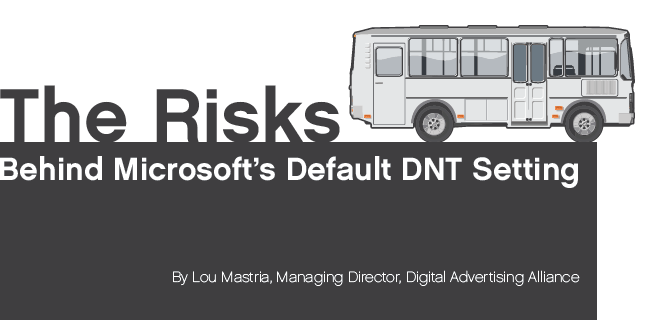
The online advertising industry, which subsidizes the commercial Internet consumers love today, is rightfully concerned about the recent announcement about Microsoft Internet Explorer 10’s default settings.
“Do Not Track” (DNT) would remain the default setting in IE10, with consumers able to disable it only through a “custom” setting.
Make no mistake: Microsoft’s continued support of DNT as the default setting in IE10 risks advertising support for free and low-cost internet products and services. The default setting on any browser needs to enable the open and transparent web. This is critical to the role that data plays in helping to subsidize the free and low-cost services available on the Internet today.
Crippling a Thriving Ecosystem
Responsible online data collection is not a “problem” to be fixed, but an essential part of the commercial web’s architecture, which requires websites to collect non-personal information for basic functions, from serving a page to frequency capping. DNT as a default on any browser, or embedded into initial settings and which would undercut incentives to abide by commonly understood and privacy-protective responsible data collection and use principles – as well as undercut many ad-supported programs.
The business community has invested millions of dollars to develop and implement a mechanism creating significant privacy-protective benefits for consumers:
- The DAA icon reassures consumers that any brand using it has also committed itself to responsible data use practices.
- The DAA icon provides meaningful, and in-context choice for consumers who wish to control their web experience.
- The DAA icon binds an entire ecosystem of Internet companies who have committed to common principles for online advertising, meaning that consumers can rightly expect a consistent browsing experience regardless of technology, publisher, or content.
This approach balances consumer privacy with consumer demand for free or low cost products and services, while ensuring business can continue to innovate. Microsoft has been and continues to be a party to these initiatives, making its recent announcement that much more concerning. It had appeared that the company understood the value and benefit of ecosystem-wide responsible data use and providing a consistent user experience across the Internet in a technology-neutral way.
The proposal also creates the unintended consequence of driving a wedge between brands and consumers. This portends a scenario whereby consumer trust in online advertising and the brands relying on it erodes dramatically. The next question is: who will subsidize the commercial Internet then?
Other than Wikipedia, each of the top 10 online publishers depends on the thriving online data ecosystem since they are each free to consumers and wholly dependent on advertising revenue. The reality of today’s Internet is that the flow of data supports the thousands of large and small online publishers who rely on data collection to support their businesses with advertising. A 2010 study by the Network Advertising Initiative (PDF) and conducted by Howard Beales, the former Director of the Bureau of Consumer Protection at the FTC, showed that data-driven online advertising provides benefit for both consumers and advertisers.
A Worthier Goal
The Digital Advertising Alliance (DAA), has built a self-regulatory program that enables a more transparent ecosystem, balancing consumer interest in privacy with business-driven innovation. The DAA’s Self-Regulatory Program gives consumers transparency and choice over their browsing data, while ensuring that necessary business and technical functions can continue. Importantly, it also preserves the role of brands in promoting trust with their consumers by tying responsible data use to a prominent, recognizable and ubiquitous icon which consumers can interpret and act upon as they wish.
DAA’s Advertising Choices Icon is served in more than one trillion ad impressions per month, and it is reaching virtually all U.S. consumers online with transparency and choice about their web experience. Through global collaboration the DAA is assisting in the roll out of similar privacy protective programs around the world.
The Council of Better Business Bureaus and the Direct Marketing Association (DMA) actively enforce our program using industry-leading technology that has already identified and called out more than a dozen bad actors. The Federal Trade Commission, Commerce Department, and the White House have all praised the DAA’s achievements. Advertisers have embraced it because they understand how much consumers favor more transparent relationships with them.
In short, the program is working. Thanks to the DAA, more consumers understand that web media works like all other kinds of free media, with advertising supporting it.
As celebrated at the White House event in February (PDF), we already have consensus about how best to proceed, while retaining the values of today’s internet economy by utilizing a default opt out choice.
Thanks to the DAA and our industry self-regulatory program, consumers can enjoy a more transparent internet ecosystem. The parties that collect and use data online within the DAA program do so responsibly and for consumer benefit. Our program is about enabling that transparency, along with the continued growth of a thriving ecosystem. DAA is working to ensure that the entire ecosystem (Microsoft included) also supports this worthy goal.
 |
Macro-level changes are coming, and you can sieze the opportunities that follow at OPS NY. This event will bring together digital advertising leaders and ops professionals to discuss a rapidly evolving landscape and develop strategies for monetization. Register today for OPS NY which will be held Oct. 4, 2012. |